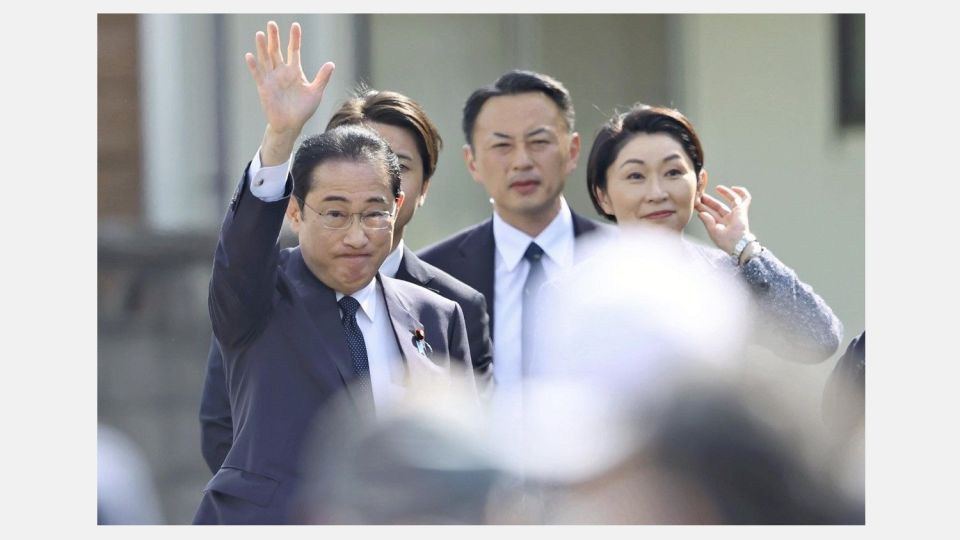April 30, 2024
TOKYO – The Liberal Democratic Party’s effective defeat in all three by-elections for the House of Representatives on Sunday is likely to strengthen speculation that Prime Minister Fumio Kishida will struggle to dissolve the lower house.
Among the three electoral districts in play — Tokyo Constituency No. 15, Shimane Constituency No. 1 and Nagasaki Constituency No. 3 — the LDP fielded a candidate only in the Shimane race and lost that battle to the opposition Constitutional Democratic Party of Japan.
Kishida, who is also LDP president, is almost certain to see his influence within the party decline, which will cast a shadow over his management of the government.
“This often happens in an election that takes place after a scandal,” Kishida reportedly said to people around him on Sunday. “We have no choice but to overcome the challenges one by one.”
LDP members may increasingly move away from Kishida, but there are currently no signs that efforts to remove him from the party leadership are strengthening.
“If the party is seen to be engulfed in infighting, that will have a negative impact,” a former cabinet member said, adding that LDP members are exercising restraint amid the strong headwinds now battering the party.
Another reason for the lack of significant criticism against Kishida may be that many lawmakers have been away from the Diet for overseas trips and regional activities during the Golden Week holiday period.
The prime minister is said to be aware that it will be extremely difficult to dissolve the lower house in June, but he still retains that option.
A fixed-rate tax reduction, a key policy of the Kishida administration, is planned to be implemented in June. Some within the government are hoping that the atmosphere will change if the economic situation improves as a result of tax cuts and wage hikes. Kishida is believed to be intending to make a move if the approval rating for his Cabinet recovers to a certain degree once revisions to the Political Funds Control Law are completed by the end of the current Diet session.
Whether to dissolve the Diet is regarded as solely the decision of the prime minister. However, if Kishida tries to force through such a move, he is certain to face a backlash from LDP members concerned about a possible loss of Diet seats. It is therefore increasingly difficult to dissolve the Diet.
“If the prime minister tries to dissolve the lower house, I will do everything to stop him.,” an LDP executive told a younger lawmaker. Senior officials of Komeito, the LDP’s coalition partner, have also openly expressed their desire not to hold a snap election in the near future.
If Kishida decides to dissolve the lower house and the LDP loses a significant number of seats, he may have difficulty running for the LDP presidency again. Some people close to the prime minister are cautious, with one saying, “It would be best for him to refrain from political maneuvering, including personnel changes, and instead concentrate on policy implementation and seek a mandate in the [LDP] presidential election.”
Will post-Kishida moves gain momentum?
Kishida’s LDP presidential term is set to expire in September. The best scenario for him is to win the next lower house election and then smoothly secure reelection as LDP president, on the back of voter confidence.
However, the LDP’s dismal performance in Sunday’s by-elections is expected to lead some LDP members to think that Kishida is “not sufficient as the face of elections” for the party. Given that, LDP members are likely to become more aware of moves toward a post-Kishida leadership.
Among Cabinet ministers and senior party officials, LDP Secretary General Toshimitsu Motegi, digital minister Taro Kono and Sanae Takaichi, minister in charge of economic security, are eyeing the opportunity to run for the LDP’s top post.
Motegi appears to be seeking to expand his support by taking advantage of his good relationship with LDP Vice President Taro Aso, who maintains his own party faction and serves as Kishida’s “backer.” Motegi is also repeatedly dining with younger members of the faction once led by the late former Prime Minister Shinzo Abe.
Kono and Takaichi, who both ran in the 2021 LDP presidential race, have held regular study sessions, fueling speculation that they are trying to build a foothold for a future presidential election. Takaichi has made no secret of her desire to run, saying, “I’ll be happy to fight again.”
Former Environment Minister Shinjiro Koizumi, former LDP Secretary General Shigeru Ishiba and Kono have strong name recognition, so they may gain more support within the party as “the face of elections” to replace Kishida. Both Koizumi and Ishiba were asked by the party to visit the Shimane electoral district to support the LDP candidate during campaigning, even though they are not currently in LDP executive positions.
It has been speculated that the trio might receive support from non-mainstream LDP figures, such as former Prime Minister Yoshihide Suga and former Secretary General Toshihiro Nikai. Suga and Nikai have maintained a certain distance from Kishida.
Foreign Minister Yoko Kamikawa has attracted attention as a possible candidate for the nation’s first female prime minister. Aso has described her as a “new star,” and respondents to a recent opinion survey conducted by various companies ranked her high among the top figures for a possible next LDP president.

